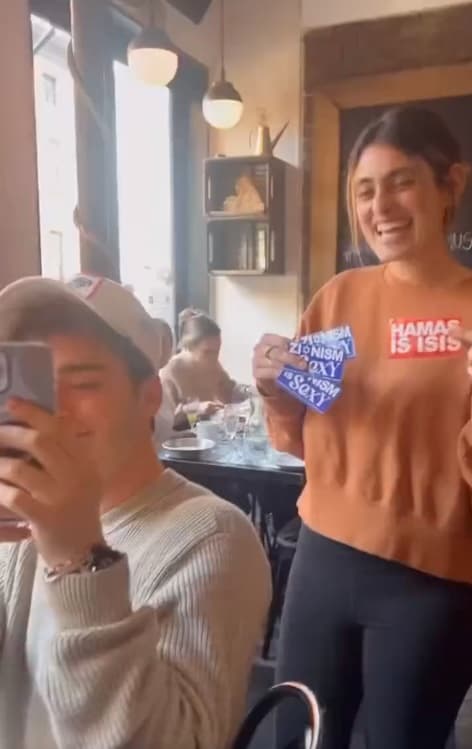Jewish ‘Stranger Things’ Star Noah Schnapp Faces Backlash From Anti-Israel Fans Over ‘Zionism Is Sexy’ Video
Schnapp’s post comes as TikTok, which is widely popular among America’s youth, has become a hotbed of anti-Israel sentiment.

A “Stranger Things” star, Noah Schnapp, is facing a furious backlash from his enormous online fan base over his strong support of Israel.
Users on X and TikTok, where Mr. Schnapp has large followings, are particularly enraged by a recent video, posted on X, in which a beaming Mr. Schnapp and his friends pose with stickers saying, “Zionism is Sexy” and “Hamas is ISIS.” The video has since received more than four million views.
Mr. Schnapp, 19, who is Jewish and had his bar mitzvah in Israel, faced immediate backlash. “Seeing these rich people with huge smiles on their faces as they support a genocide from the comfort of a cute little coffee shop is disgusting,” one user’s comment on X read. The comment has received more than 40,000 likes and 730,000 views.
The backlash continued on TikTok, where Ms. Schnapp has 32.6 million followers. “How would you feel if you were being bombed … while being stuck under rubble?” one TikTok user, whose post received nearly 500,000 views and dozens of messages of support, asked. Dozens of users made posts deriding Mr. Schnapp’s support for the Jewish state as “disgusting” and “sick and twisted.”

In another post, TikTok users were urged to boycott “Stranger Things,” one of the most popular shows on Netflix. Mr. Schnapp plays Will Byers in the show, now entering its fifth season. In January, he came out as gay on TikTok.
Mr. Schnapp has been open about his support for Israel in the past. Shortly after the Hamas terror attack, on October 11, he said on Instagram, where he has 25 million followers, that “as a Jewish American, I am afraid. Afraid for my brothers and sisters in Israel, who have been senselessly attacked by Hamas.”
He noted, “The same people who love to jump on fashionable causes like supporting Ukraine and combating climate change have been chillingly quiet.”
Mr. Schnapp’s post comes as TikTok, which is widely popular among America’s youth, has become a hotbed of anti-Israel sentiment.

A study by Axios stated that views on the platform with the hashtag “#standwithPalestine” received 285 million views between October 23-30. The most popular locations for these posts, according to TikTok’s data, are in Malaysia, Pakistan, the United Arab Emirates, Bahrain, and Qatar.
Views with the hashtag “#standwithIsrael” have received a relatively small fraction of 64 million views, with posts being most popular in Israel, Malaysia, Greece, Lithuania, and Croatia.
The onslaught of anti-Israel content has resulted in renewed calls from lawmakers on Capitol Hill to ban the social media platform, which is owned by a Chinese company, ByteDance. In recent weeks, a Republican senator of Missouri, Josh Hawley, sent a letter to the Department of the Treasury urging the administration’s Committee on Foreign Investment to demand that the Chinese sell TikTok.
In December of last year, Representative Mike Gallagher of Wisconsin, and Senator Rubio of Florida, both Republicans, introduced legislation to ban TikTok. Mr. Gallagher recently stated that the app was “brainwashing” American youth into sympathizing with Hamas. Mr. Rubio had separately accused Communist Chinese party officials of using TikTok to spread propaganda to Americans.

The various legislative threats against TikTok have not been successful. During President Trump’s administration, he threatened to shut down TikTok in the U.S. but did not act on his threat. The social media platform is enormously popular in the U.S. and is eclipsing Snapchat, Facebook, and Instagram among American teenagers and children, who are believed to spend about an hour and a half a day on TikTok on average.
In response to recent criticisms of the platform’s anti-Israel bias, TikTok defended the platform’s integrity and stated that direct comparison of material was flawed.
The company stated, “Our recommendation algorithm doesn’t ‘take sides’” and, “Attitudes among young people skewed toward Palestine long before TikTok existed.” It also defended its impartiality by pointing to data from competitors Facebook and Instagram where messages that included the hashtag “#freePalestine” were shown to also greatly outnumber those tagged “#standwithIsrael.”
TikTok also noted: “Millions of people in regions such as the Middle East and South East Asia account for a significant proportion of views on hashtags,” in relation to the spread of the #freePalestine hashtag.
It states that there is more balanced coverage in the UnitedStates: “The hashtag #standwithIsrael may be associated with fewer videos than #freePalestine, but it has 68% more views per video in the US, which means more people are seeing the content.”

